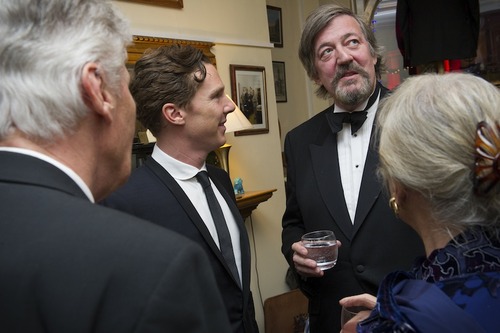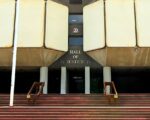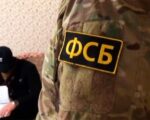>> Benedict Cumberbatch in call to pardon convicted gay men
Les acteurs britanniques Benedict Cumberbatch (The Imitation Game, Sherlock) et Stephen Fry (The Hobbit, V for Vendetta) ont demandé au gouvernement britannique de gracier tous les hommes autrefois condamnés pour homosexualité au Royaume-Uni, à l’image de ce qui a été fait pour le génie des mathématiques Alan Turing.
« Les excuses (présentées en 2009 par le gouvernement de Gordon Brown) et la grâce (accordée en 2013 par la reine) d’Alan Turing sont les bienvenues mais laissent de côté plus de 49.000 hommes qui ont été condamnés par la même loi et dont beaucoup se sont suicidés », écrivent-ils dans une lettre ouverte publiée samedi dans le quotidien The Guardian.
« Les lois homophobes du Royaume-Uni ont rendu intolérable la vie de générations d’hommes homosexuels et bisexuels. C’est aux jeunes leaders d’aujourd’hui, y compris le Duc et la Duchesse de Cambridge, de reconnaître cette facette de notre histoire et de ne pas la laisser perdurer », précise la lettre, interpellant directement le Prince William et son épouse Kate.
« Nous appelons le gouvernement à entamer une discussion sur la possibilité de gracier tous les hommes, vivants ou décédés, qui, comme Alan Turing ont été reconnus coupables », termine la lettre également signée par le militant des droits de l’homme Peter Tatchell et le réalisateur norvégien Morten Tyldum.
« Outrage aux bonnes mœurs »
Ce dernier a réalisé The Imitation Game, le film biographique sur Alan Turing nommé pour huit oscars et neuf Bafta, dans lequel le mathématicien briseur des codes nazis est interprété par Benedict Cumberbatch.
Alan Turing, condamné en 1952 pour « outrage aux bonnes mœurs » et contraint à la castration chimique, est mort deux ans plus tard à l’âge de 41 ans, empoisonné au cyanure — sans que la thèse généralement retenue du suicide n’ait jamais été formellement prouvée.
Certains historiens estiment que son coup de génie qui lui a permis de décrypter codes nazis a précipité la chute d’Hitler, qui autrement aurait pu tenir un ou deux ans de plus.
» La bande-annonce de « The Imitation Game » :
Durant sa courte existence, Alan Turing aura par ailleurs réussi à poser les fondations de l’informatique moderne et à définir les critères de l’intelligence artificielle encore en vigueur aujourd’hui: le fameux « test de Turing » qui se fonde sur la faculté d’une machine à tenir une conversation.
La lettre ouverte renvoie vers une pétition sur la plate-forme Change.org plaidant également pour la grâce de ces quelque 49.000 hommes, dont 15.000 seraient encore vivants. Samedi midi, elle avait réuni plus de 75.000 signatures et les chiffres continuent de grimper : www.Pardon49k.org
L’homosexualité a été dépénalisée en Angleterre et au Pays de Galles en 1967 puis en Écosse et en Irlande du Nord au début des années 1980.
>> Pardon all of the estimated 49,000 men who, like Alan Turing, were convicted of consenting same-sex relations under the British « gross indecency » law (only repealed in 2003), and also all the other men convicted under other UK anti-gay laws.
Each of these 49,000 men deserves the justice and acknowledgment from the British government that this intolerant law brought not only unwarranted shame, but horrific physical and mental damage and lost years of wrongful imprisonment to these men. Alan Turing was pardoned in 2013, but the other estmated 49,000 men deserve the same.
>> Benedict Cumberbatch, the star of The Imitation Game and an Oscar hopeful, has added his name to an open letter urging the British government to pardon thousands of gay men convicted of gross indecency.
Cumberbatch, who plays codebreaker Alan Turing in the Oscar-nominated biopic, has joined more than 40,000 people signing the letter to the government. The letter calls on members of the royal family to back the campaign to give a pardon to all those who were convicted of a crime because of their sexuality – a pardon that could wipe clean the records of 15,000 men still alive.
The letter states: “The UK’s homophobic laws made the lives of generations of gay and bisexual men intolerable.
“It is up to young leaders of today including the Duke and Duchess of Cambridge to acknowledge this mark on our history and not allow it to stand.
“We call upon Her Majesty’s government to begin a discussion about the possibility of pardoning all the men, alive or deceased, who like Alan Turing were convicted.”
Turing led efforts to crack the Nazi Enigma code and was hailed by Winston Churchill as the person who “made the single biggest contribution to the allied victory in World War II”.
He was convicted of gross indecency in 1952 and was chemically castrated. He took his own life in 1954. Turing was given an official apology by the British government in 2009, when the then prime minister, Gordon Brown, spoke of the “appalling treatment” he had been subjected to. Four years later, the Queen granted him an official pardon.
The letter continues: “Turing was one of the greatest heroes of the 20th century, a man whose work on the machines that deciphered the Enigma codes helped win World War II and who was pivotal in the development of modern computers.”
Other signatories to the letter include actor and broadcaster Stephen Fry, civil rights campaigner Peter Tatchell, The Imitation Game’s director, Morten Tyldum, and Rachel Barnes, who is Turing’s niece.
Turing was one of 49,000 men convicted of indecency under laws banning gay sex. He admitted in court he had formed a relationship with a friend, Arnold Murray, and was offered a choice between a prison term or undergoing a course of drug treatments aimed at controlling his libido.
AFP


















